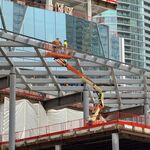steveintoronto
Superstar
The cynical comments are well-founded. Canada used to be an example to European nations, especially the UK, of 'how to do it', and the Brits were not much better in many cases than bumbling idiots on these things (I'm not prejudiced, I'm a Brit/Cdn Dual). But the tables have now been turned on that, and it's well worth examining why:
https://www.civilserviceworld.com/a...et-how-get-major-infrastructure-project-rightCrossrail: on time and on budget, is this how to get a major infrastructure project right?
Written by Colin Marrs on 8 February 2016 in Feature
Crossrail, the capital’s new east-west rail link, is on track to open on time and on budget. As well as being a boon for commuters, it could also improve the UK’s reputation for delivering major infrastructure projects. Colin Marrs digs around for some lessons
In less than three years, passengers will pour through ticket barriers onto the platforms of a major new London rail line. The Crossrail project is one of the most ambitious transport construction projects ever undertaken in the UK, creating 21km of twin tunnels beneath the capital’s streets. When fully operational in 2019, the line will connect Reading and Heathrow in the west to Shenfield and Abbey Wood in the east.
Despite spending decades in gestation, delivery of the project has been remarkably smooth, with the government claiming the project will be delivered on time and on budget. Experts seem to agree that the governance structures put in place for the Crossrail project have helped put the UK back on track when it comes to delivering major transport infrastructure. So what’s the secret?
It can be argued that the Crossrail concept is more than a century old. During the 1880s, parliament gave permission for the Regents Canal & Railway Company to create a surface line between Paddington and east London’s busy docks. The scheme was aborted, but a similar idea resurfaced in 1944 as one of the less well remembered – and unfulfilled – parts of the famous Abercrombie Plan for the capital.
Crossrail ‘textbook example’ of good programme management, says report
Major Projects in focus: Is HS2 on the right track?
The Crossrail name itself was coined in a 1974 rail study by the Greater London Council and the Department for Environment, but it wasn’t until 1991 that a private bill allowing for the creation of the line finally came before parliament. A global recession and the tightening of public finances that ensued put paid to those plans, with MPs finally rejecting the bill in 1994.
Steven Norris, who served as a Conservative junior transport minister from 1992 to 1996, was a big proponent of Crossrail and played a key part in a fresh drive to revive the project via a hybrid bill in 1996. This attempt was scuppered “due to the Treasury playing its usual duplicitous games,” he says ruefully. Indeed, even the Department for Transport’s own permanent secretary at the time, Sir David Rowlands, was none too keen on the project. “He told me later: ‘You kept the thing alive when we all wanted to kill it’,” Norris says.
The aborted 1990s attempts had, however, pushed the project forward in one critical regard: the safeguarding from development of sites above proposed Crossrail stations. With this protection locked in, further momentum was provided in the run-up to the first election for London mayor in 2000. Norris, by now the Conservative candidate, and his victorious rival Ken Livingstone both backed Crossrail. “I was a strong advocate in the technical press, but Ken also deserves credit for pushing for it,” Norris says.
"Not dictated by traditional budget cycles”
[...continues...]




